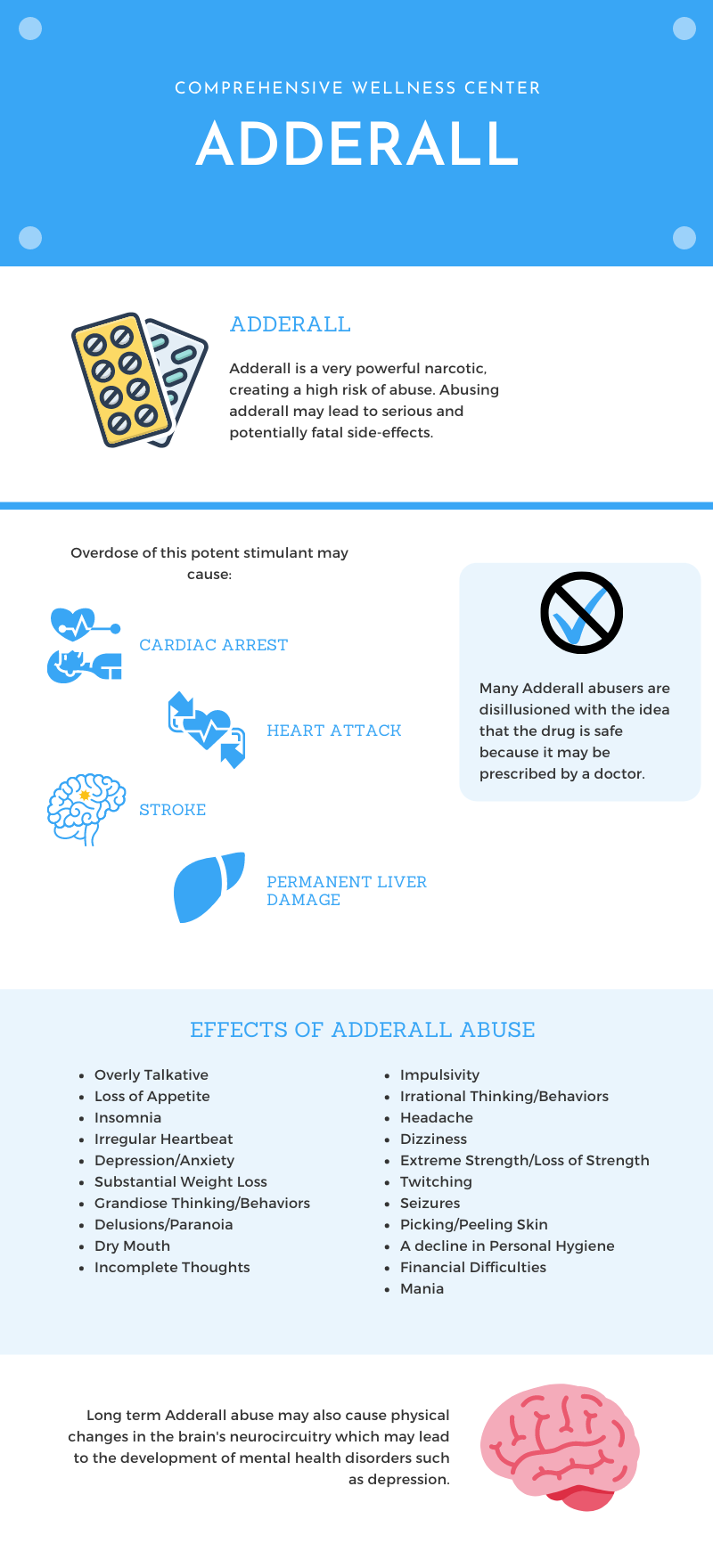If you have been to college, you are probably familiar with Adderall – also referred to as amphetamine. Adderall is a central nervous system stimulant that is commonly prescribed to people who are diagnosed with attention deficit hyperactivity disorder (ADHD). It is a schedule II substance, meaning it has a high potential for abuse. However, the drug is becoming increasingly common on college campuses, and sometimes it is even encouraged. Some use it to stay awake for long hours studying, while others abuse it at parties.
In 2016, a study the Journal of Clinical Psychiatry estimated that nonmedical Adderall abuse increased by more than 67%. It is the perfect drug if you need to stay up all night and intently focus on studying or writing a long essay, but it can quickly become addictive and cause devastating effects on the body.

How Adderall Works
Shortly after taking Adderall, the user experiences a euphoric rush of energy and becomes extremely alert and focused. This occurs as the amphetamine binds to receptors in the brain to increase the activity of neurotransmitters by overflowing the brain with dopamine and norepinephrine.
Dopamine plays a huge role in the reward and motivation pathways of the brain. When the brain becomes accustomed to having an excess amount of dopamine available, it will begin to demand it when it begins to get low, causing a person to develop dependence for Adderall. If this demand is met by repeated Adderall abuse, the brain’s reward pathways will become rewired. The rewiring of the brain is what causes an addiction to develop rapidly.
Due to the focus and energy that Adderall provides, it has become a popular study drug among students who are overloaded with school assignments. This is becoming more and more common among college students because of how effective short term Adderall use may be for them, but they fail to consider the risk of addiction and how it can affect their body long term.
Signs of Adderall Addiction
Recreational use can quickly develop into Adderall addiction. Adderall addiction typically effects a different demographic than most other substance addictions. People who become addicted to drugs like opioids, benzodiazepines, or alcohol typically do so while suffering an inability to cope with their emotions. Adderall addiction, on the other hand, frequently occurs in those who need help staying alert and focused.
Some signs that a person has a problem with Adderall include:
- Rapid speech and increased socialization
- Doctor shopping
- Spending substantial amounts of money and time getting the drug
- Increased work ethic
- Lack of sleep and appetite
- Appearing scared when not having Adderall
- Using Adderall other than prescribed (crushing, snorting, or injecting)
- Continuing to take Adderall even if it is causing harm>
- Needing to take increasingly high doses to produce effects
Despite differences between amphetamine addiction and other addictions, all addictions share many of the same effects on the mind and body.
Effects of Adderall Abuse on the Body
When abused over time, Adderall can cause serious effects on the body. These are similar to the effects of other stimulants. In addition, a person who is physically dependent on Adderall will experience many psychological side effects if they abruptly stop taking it.
Amphetamines decrease a persons appetite so Adderall abuse can be linked to weight loss and malnutrition. A common co-occurring condition among people who use Adderall is types of eating disorders because it helps a person get rid of food cravings. Malnutrition, which occurs when the body doesn’t get the vitamins and nutrients needed to survive, usually leads to fatigue. However, when taking Adderall, a person may not notice how tired their body is, causing them to be overworked and at risk for serious health problems like severe headaches, dizziness, hallucinations, and fainting.
Other physical side effects could include convulsions, rapid heart rate, paranoia, increased blood pressure, and depression. These side effects may become worse over time as a person’s addiction progresses.
A person who is advanced in their addiction to Adderall may experience withdrawal symptoms if they attempt to get sober cold turkey. Like other amphetamines, Adderall withdrawal is mostly psychological, characterized by depression, irritability, anxiety, and even suicidal thoughts. If you experience any of these symptoms when you quit taking Adderall, the best course of action for you to take is through a medical detox and addiction treatment.
Getting Help for Adderall Addiction
If you or a loved one is suffering from Adderall addiction, it is best to get help now rather than later. Continued Adderall abuse can result in serious health problems and mental disorders. Our addiction specialists will help determine the best treatment plan to meet your needs.
Sources:
Live Science Adderall: Uses, Side Effects, and Abuse
Journal of Clinical Psychiatry Prescription and Nonmedical Use…Involving Stimulants
PsychomAdderall (amphetamine)













